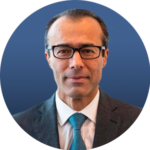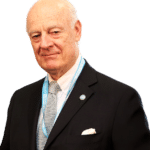MED Panels

Randa Slim
Director, Conflict Resolution and Track II Dialogues Program, Middle East Institute, USA

Cornel Feruţă
State Secretary for Global Affairs and Diplomatic Strategies, Ministry of Foreign Affairs, Romania

Niels Annen
Minister of State, Ministry of Foreign Affairs, Germany

Sven Koopmans
Special Representative for the Middle East Peace Process , European Union

Khaled Khiari
Assistant Secretary-General for the Middle East, Asia and the Pacific, United Nations

Staffan De Mistura
Personal Envoy of the Secretary-General for Western Sahara, United Nations
Multilateralism has been one of the key pillars of the global institutional architecture since the end of WWII and has played a central role in the promotion and sustainment of peace and prosperity worldwide for over seventy years. Nonetheless, in recent years, the prospects of multilateralism have become more fragile whereas the legitimacy and efficacy of multilateral solutions have been questioned and challenged. Cooperation in the fight against the pandemic has reversed this trendy only partially. Against this backdrop, some positive signs of the capacity of the international community to ease political tensions and prevent violent conflicts in the broader Mediterranean have emerged recently. This has provided hopes about a resumption of the fundamental role of multilateral institutions in conflict resolution efforts and in implementing shared, equitable, and effective solutions towards peace and stability.
Challenges such as protracted conflicts, international disputes, sectarian divides, and human rights violations all underline the urgent need of building a new approach to international governance and rules-based international cooperation. How can the international community bring multilateralism back in? Which topics or areas can serve as leverages to enhance multilateral cooperation? Is it possible to imagine a reformed and more inclusive multilateral system, able to address the future challenges of the enlarged Mediterranean? Which scenarios do these renewed ambitions open for conflict resolution and peacebuilding?